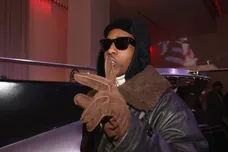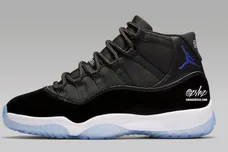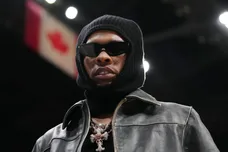In the 90 days following his release from prison in July 2022, Finesse2Tymes has done what most artists take years to accomplish. The East Memphis native has spent a lot of his life with jail time looming over him. However, he hasn't let that define him, his career, or his potential. At 21 years of age, he started Memphis Greatest Underrated with artists like Moneybagg Yo and Black Youngsta. The collective is still making waves and continues to establish Memphis as the hot spot for hip-hop right now.
While Finesse was in jail for five years, he spent time perfecting his craft and writing the greatest songs of his career so far. After viral singles like "Back End" and "Humble," the rising star has undeniably returned home to a much bigger audience than he left behind.

Make no mistake, though; he knows his growth is just beginning. After making amends with Moneybagg Yo over previous beef, the two have come together in the studio once again. Additionally, the "Summo" artist has linked with many other huge names in trap, like Gucci Mane and DaBaby. After signing a deal with Atlantic Records, in partnership with J. Prince Jr.'s Mob Ties label and Moneybagg's Bread Gang Entertainment, it seems Finesse is due to make some huge waves in the game.
So all this begs the question: how does the 30-year-old feel about the experiences that have brought him to this point? That's what he'll address on 90 Days, his forthcoming project that will reflect on his success and his struggles. A lot has changed since he left to serve his time, but at his core, he remains the same man.
All he's seen in both the industry and his life has left him with a hard-working mindset. Because of this, the southern spitter doesn't let himself get caught up in the typical industry trappings of fame, beef, or shady hustles. He values his freedom and the power he has to inspire some change. Additionally, he cares about his connection with people and the lessons that he's been taught through honest determination.
We spoke with Finesse2Tymes about what his recording process for 90 Days was like, the sound that he creates through his music, inspirations and musical admirations outside of hip-hop, moving past grudges to push forward, his morals and principles, his recent viral status, and what might be in store for him beyond the confines of the rap game.
This interview has been edited and condensed for clarity.
HNHH: Thanks so much for the opportunity, y'all, it's great to get to talk to you. I know that you still put out music while you were in jail and you have pages and pages of material that you wrote while in there. What was it like to be out and record for the first time after getting out and how did it feel to kind of bring those ideas you were working on to life?
Finesse2Tymes: I had been behind a cell so, you know, I hadn't been in no studio then but I've had experience in studios since I started working with music. So you know, of course I had that itch but I was kind of spooked too. I didn't how it's gonna sound, you know, being gone so long I was worrying about my new sound and s**t like that. But other than that, the ideas just come authentically, the ideas were just off the head.
I know that this is a major label that debut for you, 90 Days. How would you compare the recording and the support and the process that you went through compared to earlier mixtapes like Goin' Straight In or even further back?
I've had them songs already. I had them done, like they was already done coming out the door like, I believe that I had my first album probably like two weeks of me being out.
So it must've been a really fast recording process, then?
I got so much material, all I had to do is go in there, put an instrumental on, and I'm gone.
I actually wanted to ask you a little bit about the instrumental process. Do you have a particular kind of sound that you look for when you are recording songs? Or a particular producer that you might like to work with? What's that process like for you in terms of selecting those beats?
Nah, not exactly. I don't exactly got a specific person I like working with, but I got a specific type I like, like trap soul, or hardcore trap, you know what I'm saying. The struggle trap, so you know, waves like that. It's still a street theater, so I try to keep as street at the same time but I'm actually versatile. It's a certain type of beat that I can listen to and come up with some s**t that you'll be surprised by.
You recently spoke to Power 106 about wanting to make a song with The Weeknd. I wanted to ask you, what are some other of those genres or artists that you might like to work with like outside of hip-hop, given that you do have an ear for that kind of instrumental?
DDG. It can be kind of like pop, so Charlie Puth, you know what I'm saying? I'm from Memphis so we got kind of like a soul, blues-trap type. I know. You know, Memphis is the city of rhythm and blues. So I love older samples and old singers and stuff like that.
You definitely have a lot of history to work with. Do you have an artist that you really like listening to that might surprise fans?
Um… nah. I know Rod Wave is in my top three.
I did want to go back a little bit into your earlier songs. One of the ones that I've been listening to a lot recently has been "The Honest God Truth." You say, "But I can't move forward if I hold grudges."
Right.
You talk a lot about conflict and struggle in your music. How do you think that you've been able to move past those grudges and move forward in your career?
As you see with the thing I did with Moneybagg Yo, you know, we put our ideas to the side and became a partnership and everything. You know, so this is how far it came. I can't hold a grudge 'cause you can't move forward. When you're holding negative energy in the universe, period, not just a specific person, it kind of creates a bad luck vibe for you. You want to have your name clean, your face clean.
You mentioned something on Million Dollaz Worth Of Game about the morals and principles that might be lacking in rap right now. Could you speak a little bit more about the morals and principles that you stick to as an artist?
When I speak about life, there are things that you can't really see in a person's life. Behind the scenes, I'm talking about life when I say that, not a specific person or how they would move. I'm talking about in real life, I'm really standing on morals and principles.
So you're more focused on just kind of like your everyday movement outside of music?
Yeah, I'm staying the same, I ain't switching up, ain't nothing gonna change me. Money, fame, I'm still the same person. I don't rock with certain people. Even though people didn't mean to, I had to cut them off because they were hurting me better than they could help me. I'm still on that, I ain't gonna change. So I've been talking about that in life by keeping it real with yourself.

Given that realness that you're bringing on 90 Days, what are you most excited for fans to hear?
Just a new sound. Raw, authentic sound from somebody who you know has been down through there. You've seen my life, you've seen my rise and fall, you've seen me rise again. I want them to hear the new sound, the new me, my new muse.
You've given us at least some taste of that with some singles. On your most recent one, "Summo" I did want to mention a few bars that I thought were really interesting. "They talkin' down on me, got 'em mumblin'; D-d up, got 'em fumblin'; pocket stuff like omelets; Feds label me a convict." How do you think that the label of "convict" might affect your career? Additionally, how do you think that might have an impact on how you move in the industry?
A lot of rappers ain't been down through what I've been down through. So I have to move more professionally, because, you know, they ain't really been through nothing. So I'm forced to move in a certain way.
Do you feel like you're forced to move in a way where you're proving people wrong? Or do you stay completely focused on keeping it completely true to yourself?
I move how I move, I f**k with who f**k with me. I stick with the same people I stick with. Get my money, and I'mma continue to make good music and continue to move in the right way.
I know you really dedicate yourself to writing. How do you make a track come about?
All depends on how the track comes on to me. I can be listening to a song, and when the beat hit, that's how I come up with my stuff. I listen to the beat, I get down there, feel my stuff, and I go.
You've mentioned some of your musical influences before. I wanted to ask you what were some of your influences outside of music. Things like friends, family members, or even places. Are there any of those things that motivate you to create?
Just going through what I've been going through. Being in jail, being down so long, being locked up all my life like that, you know what I'm saying? I was listening to music on the street, and I wanted to become different. Everybody come on the same type of flavor, and then I just did it with a different flavor and they gon' kick it. And they gon' feel me.
You really come through as a storyteller in a lot of your songs because you paint a picture of what you live through. Was there something in particular that inspired you to tell those stories or was it just you living through these things as you said?
It was just life, like just everything I was going through. It's what inspired me to go hard like this.
On Million Dollaz Worth Of Game, you mentioned, like 20 or 30 more M's from rap music, something like that, and maybe moving on to something else. What are you taking a look at as far as other ways to help other artists or to keep your career and your focus going?
I look forward to starting my own stuff with artists… and real estate, you know, just need land, and then trying to launch my record label.
A lot of rappers like Moneybagg and also Kevin Gates have been supporting you. What do you think that you and other artists can do to keep this energy going, either musically or in a business-oriented way?
I run both. We help each other out 'cause I'm motivated, I motivate them and they motivate me, so personally, I wanna keep that side… Cuttin' things to talk about, agents… I don't really know a lot, but I teach them everything I do know.
How do you think your recent social media virality will help your career going forward, especially considering that TikTok wasn't really a thing when you were first in jail?
Oh yeah, it's going to help me out a lot. Especially with TikTok, it helps my streaming, it helps my audience, the people who the music need to reach. People are hearing me and they're taking their time to listen to what I'm saying because it's so relatable.
Do you have like a favorite trend or song that's blown up?
"Humble" is one of my favorite songs, for sure.
As I'm sure you'll talk about in the project, these 90 days have been a lot. On a lighter note, what have been some of the things that have kept you calm, you know, throughout this whole process?
Just freedom. I was telling you a lot of people ain't been through what I've been through there. Freedom alone makes me calm down and be cool and think because I know where I came from. Everything's a blessing, every move I take, every move I make… everything's a blessing.

What are you looking forward to doing after 90 Days drops?
I'm gonna sit back and let 90 Days do what it's supposed to do, and after that, I'm gonna keep the fire coming. I ain't gonna spoil it, I'm gonna let you know. You're gonna know.
If you're looking for some more Tennessee titans, we recently spoke with Duke Deuce in our latest episode of On The Come Up. At the time, he talked about bringing the city's labels together, the evolution of the Memphis sound, and his latest album CRUNKSTAR. Check that out here, and tap back in with HNHH later for more artist interviews.









